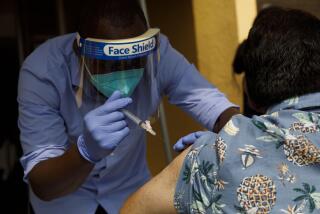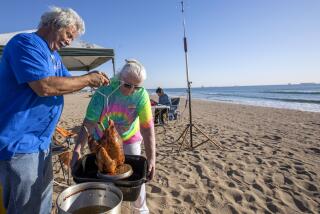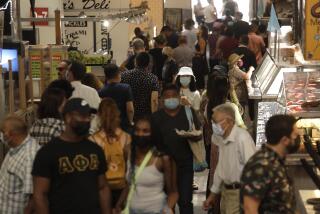- Share via
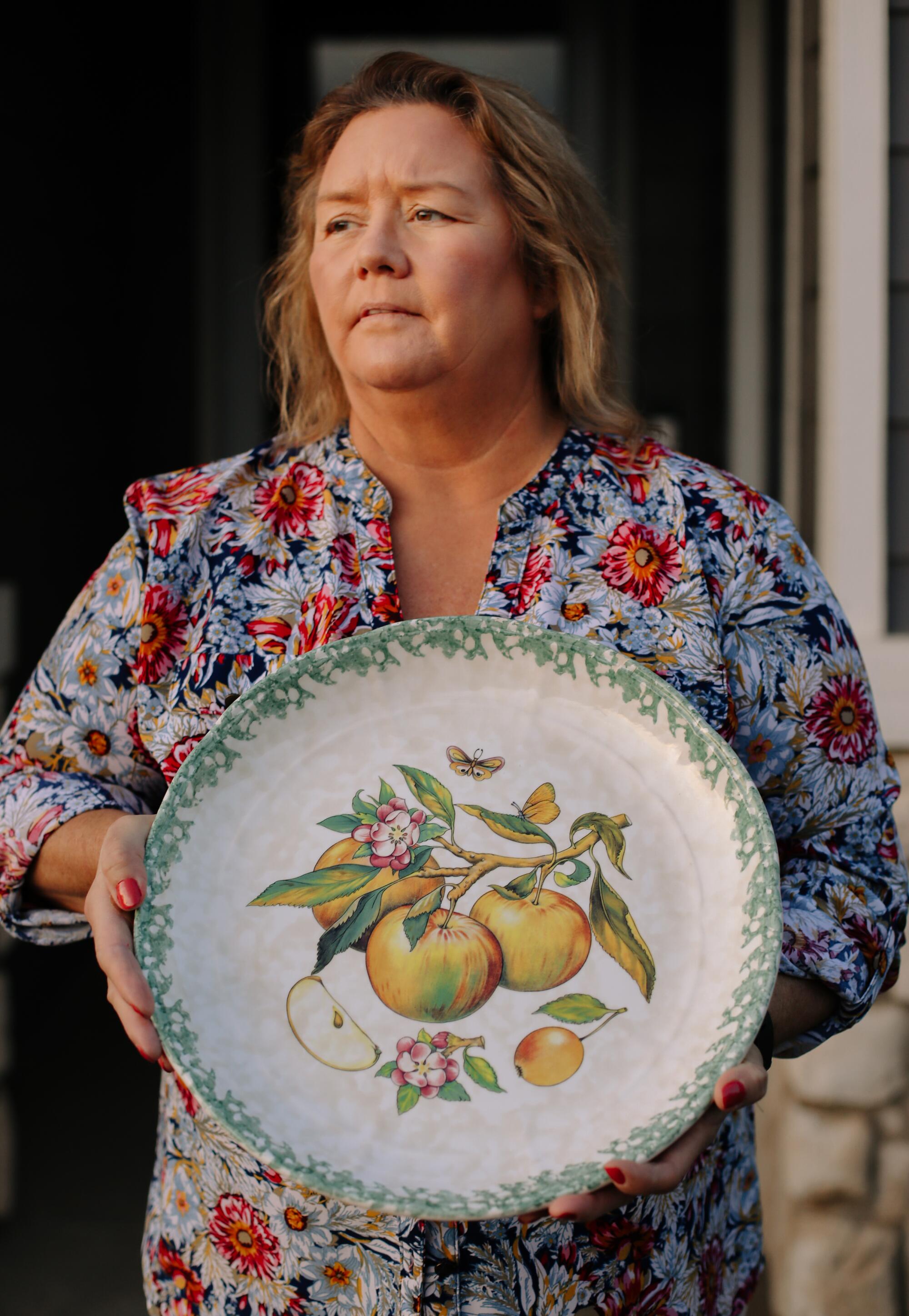
Mary Lyn Martinez followed the same Thanksgiving Day routine for years.
She’d wake up early and slide the massive fowl into the oven, so that once relatives began to arrive around noon the savory scent of roasting turkey had filled every nook of her Acton home. While they watched football, she finished making the green beans and yams, careful to adjust recipes so there’d be enough to feed the crowd of 25 friends and extended family members.
But this year, for the second Thanksgiving in a row, the 57-year-old grandmother decided to scale way back, hosting only her immediate family.
“It’s just us this year,” Martinez said, with a tinge of sadness in her voice. “Instead of looking for a 27-pound turkey, I’ll be looking for a 12-pound one.”
She loves to entertain big groups but doesn’t yet feel comfortable with a crowd of people packing into her home, especially since a few people typically invited to the gathering aren’t yet vaccinated against COVID-19.
This year, the gathering is limited to her husband, her children and their spouses and the grandchildren, all of whom have been vaccinated, other than her toddler grandson, who isn’t yet old enough for the shot. As an extra precaution, she said, everybody is also getting tested in the days leading up to the meal.
As a second pandemic Thanksgiving approaches, families across the Southland are, again, navigating what type of gathering feels reasonable during a season of togetherness amid a once-in-a-generation pandemic. Gone, for the most part, are the days of sharing virtual meals over Zoom, and some vaccinated people have largely returned to the rhythms of their pre-pandemic lives.
But many others have made a point of frequently reassessing their comfort level in crowds and directly informing unvaccinated friends and relatives about their boundaries and expectations ahead of holiday gatherings. It’s one thing, they say, to mute past tensions for a few hours and hope that the conversation doesn’t veer into fights about money, politics or religion, but quite another to sit back and accept the possibility of a health risk.
A recent survey by the Harris Poll found that 42% of vaccinated respondents had canceled at least one event or travel plan they had with people because they weren’t inoculated. In a recent discussion on Twitter about banning unvaccinated relatives from holiday gatherings, several people declared themselves staunchly “no vax, no snax,” and another person shared a link to a doormat on Amazon that reads, “Welc— WAIT, HAVE YOU BEEN VACCINATED?”
For many people, the holidays often spark both enthusiasm and stress over the idea of dinner-table debates, said Deborah Serani, a New York-based psychologist and author of “Sometimes When I’m Mad,” a children’s book about processing anger.
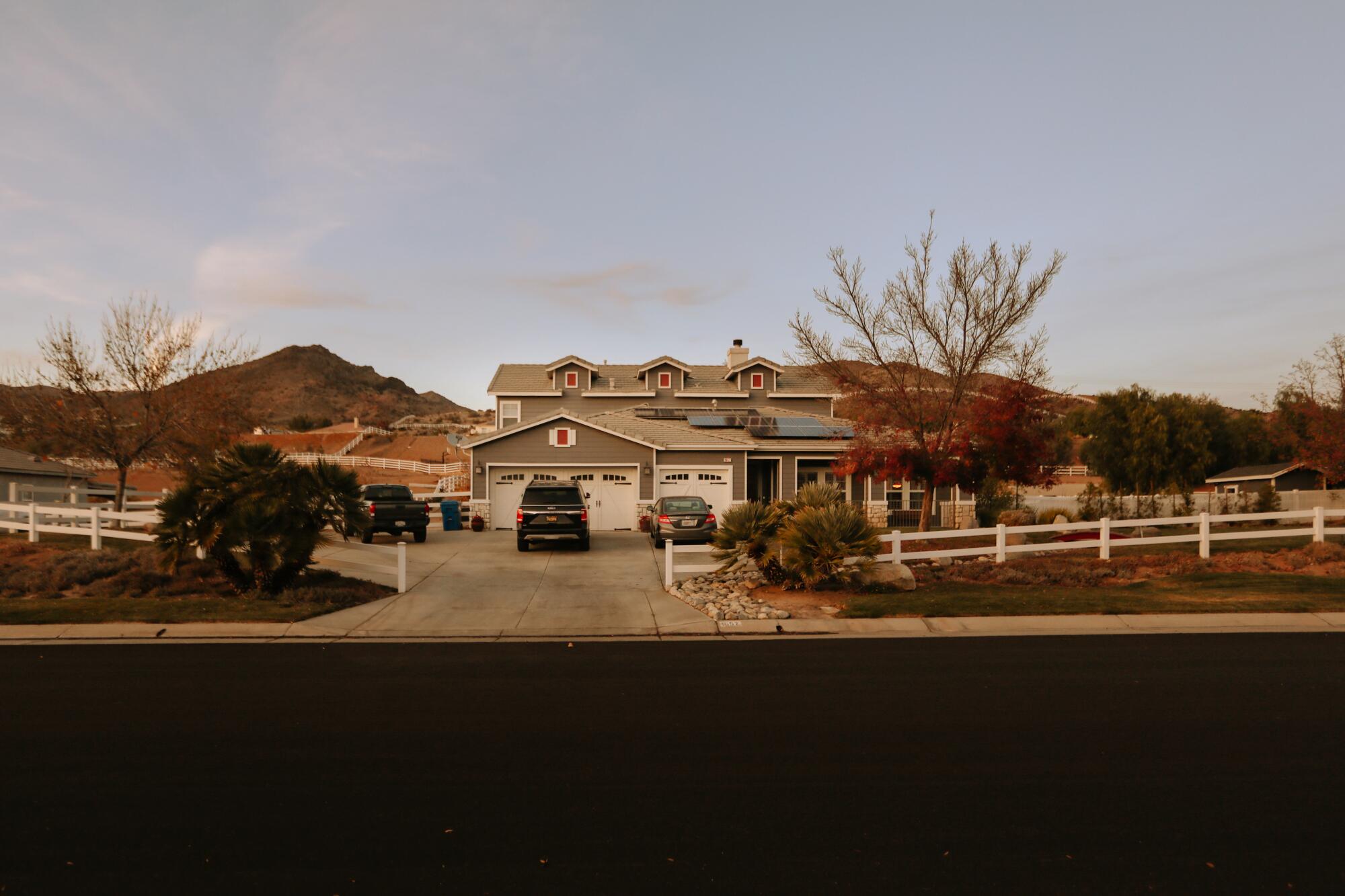
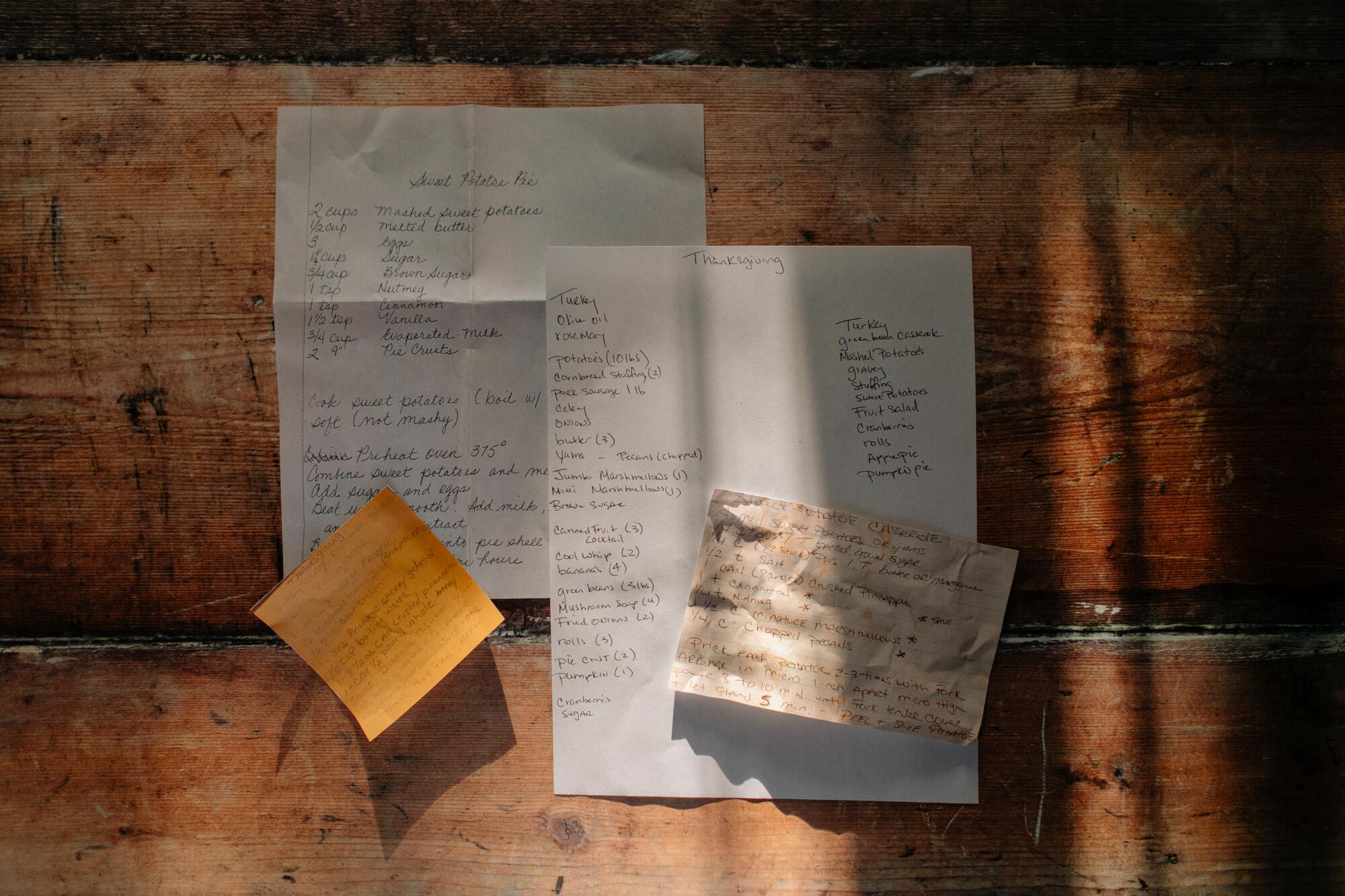
And knowing that other guests may have different views on COVID-19 precautions only adds another layer of anxiety, she said, explaining that it’s important that the person hosting the gathering plans ahead and clearly explains expectations to guests.
“You’re the quarterback. They don’t have to come to the game, but you’re making the calls,” she said. “That is a boundary for self-care.”
When she hosts gatherings, as she plans to do on Thanksgiving, she follows what she calls the 20-minute rule — allowing conversation to flow organically but not linger on a topic long enough for people to break into theatrics. After 15 minutes or so, she gives people a heads-up, and soon pivots everyone’s attention toward games, including a big white board for Pictionary, or redirects the conversation.
“You’ll just say, ‘OK, Uncle Lou, we’re going to change the subject now, thank you. Now Frank has the floor and we’re going to talk about the Jets and the Giants,’” she said.
::
While Martinez is still taking safety precautions, she said she has let her guard down since getting the vaccine.
Last year, she was holed up at home and trying to be extra careful because her mother, who lived with her, was in hospice care.
“It was a scary time.”
Vaccines weren’t yet available and Martinez often worried about the hospice nurse bringing the virus into the home, so on days when her mother seemed especially weak, Martinez took her mother’s vitals on her own and relayed them to the nurse through the door.
Her mother died in December of complications of chronic obstructive pulmonary disease, but the family postponed the funeral until August and held most of the gatherings outdoors.
It was around that time that Martinez learned that her sister, who lives in Arizona, hadn’t gotten the shot, saying she was confident that even if she got sick her immune system could fight it off. Martinez, who felt simultaneously stunned and worried, said she vividly recalls the moment her sister said she hoped that even though she wasn’t vaccinated she’d be able to hold Martinez’s young grandson.
“No, sadly,” she remembers telling her, “you’re not going to be able to.”
That stunned feeling has become increasingly familiar for many Californians, including Elly and Nick Shariat.
Earlier in the year, the newlywed couple, who live in Monrovia, got a message from a friend encouraging them to look into ivermectin, a drug used to treat parasitic infections, which has been falsely praised by many in anti-vaccine circles as a cure-all for COVID-19.
“This was totally out of the blue,” Elly said. “We were like, ‘What are you talking about? You should be way smarter than this.’”
The couple, who work in the healthcare industry, said they’d recently noticed that many people in their lives seemed to be experiencing pandemic fatigue, including some who are vaccinated but now hesitant to get a booster shot.
“I think they’re just sick and tired of this pandemic. We all are,” she said, adding that after monitoring rising case counts in Europe and talking to family, they’d decided not to travel to the East Coast or Northern California to visit relatives or to host guests at their home.
“It is sort of heartbreaking,” Elly said, “that this is year two and we can’t really do anything.”
But others are returning to their Thanksgiving Day routines — with a few added ground rules.
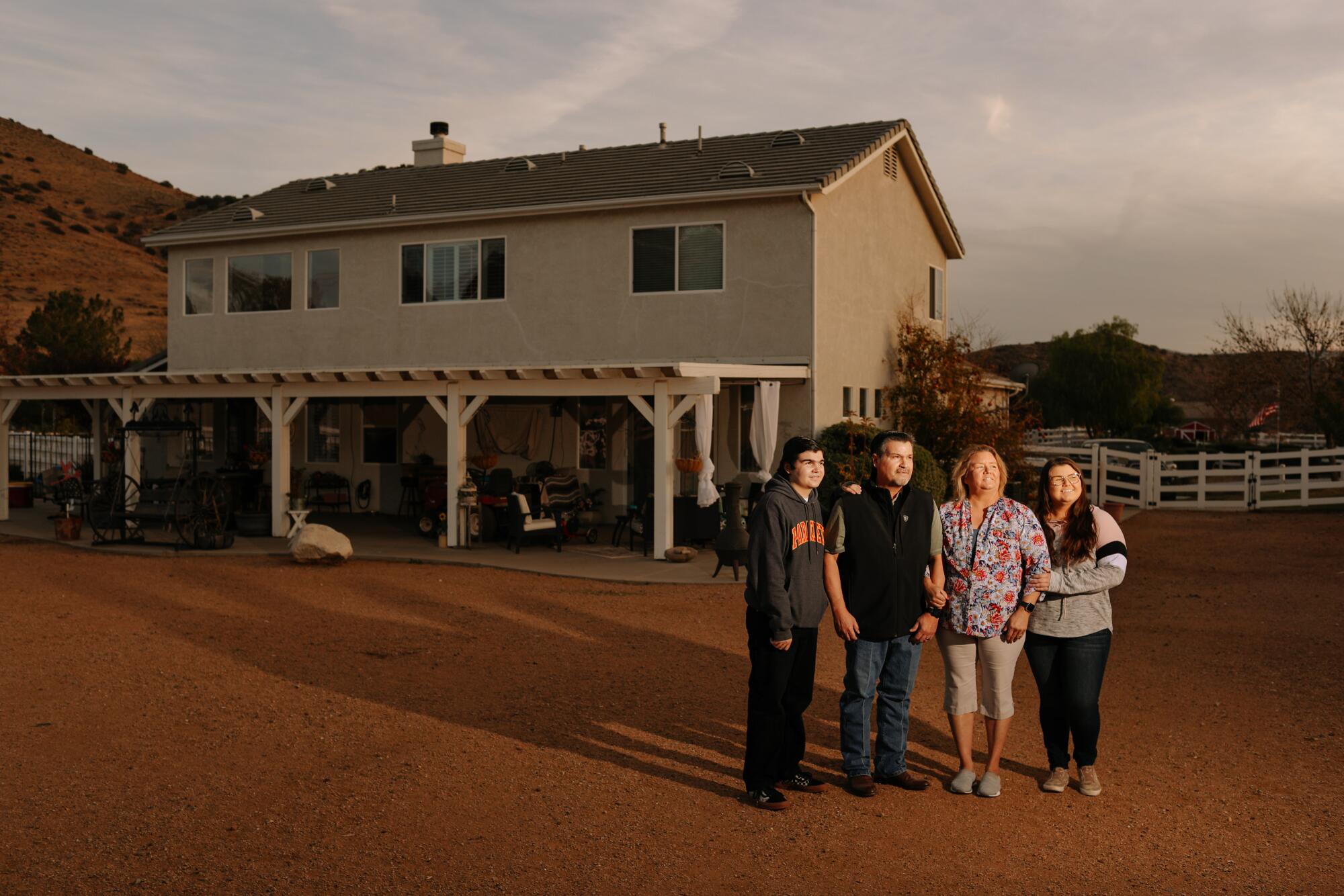
Cassie Fowler started hosting Thanksgiving about six years ago and typically sets up a long folding table in the living room of her San Marcos home so there’s space to seat the dozen or so members of her husband’s family and her husband’s best friend’s family who attend.
They’ll return to that plan this year, Fowler said, after scaling back to only a handful of people who ate on an outside patio last year. This year, as usual, her husband will make a Crock-Pot full of mulled wine and she will prepare sangria with cranberries and clementine oranges.
There had been a tense moment in September, she said, leading up to a family birthday dinner when one person didn’t want to attend if an unvaccinated invitee was coming. The situation turned into a back-and-forth about who would come and Fowler quickly decided she wanted to get ahead of the situation for the holidays. So in early November, the 38-year-old, who works in marketing, sent a message to the family group chat.
“Hello, family!!” she wrote. “To ensure everyone feels comfortable and safe, we are asking for everyone to please provide proof of vaccination *OR* a recent negative COVID test (within 3 days).”
You can text an image to the group, she told them, or if you don’t feel comfortable broadcasting your information to everyone, you can send it directly to her. To keep track, she said, she’s started a Google document, where she puts a syringe emoji by their name if they’ve been vaccinated.
She knew that the one unvaccinated relative they’d invited was unlikely to get the shot before coming — they’d already had conversations about the vaccine — but she still wanted to find a way to make them feel welcome so long as it was safe. She recently attended “Hamilton” at the Hollywood Pantages Theatre, where proof of vaccination is required or, in some instances, a recent negative test. She decided to implement a similar rule.
But in the end, she said, the unvaccinated relative declined, saying they had other plans.
More to Read
Sign up for Essential California
The most important California stories and recommendations in your inbox every morning.
You may occasionally receive promotional content from the Los Angeles Times.
